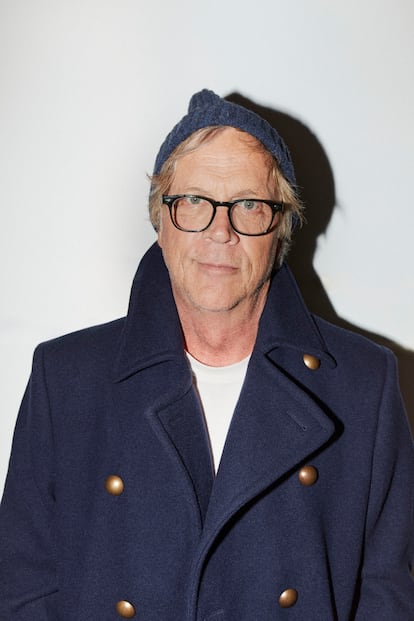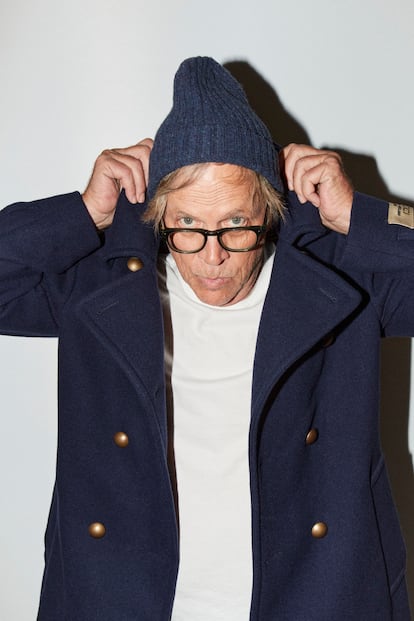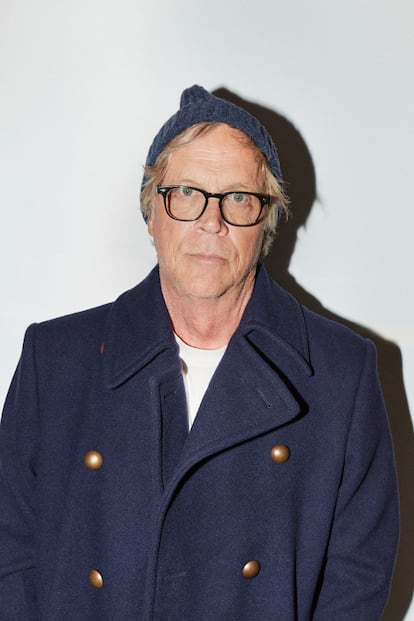Todd Haynes, director: ‘I’ve entered Almodóvar’s territory, but I’m not on his level’
The relationship between a teacher and her 13-year-old student in ‘May December’ inserts the filmmaker into a soap opera melodrama worthy of the Spanish auteur, with the help of Hayne’s muse, Julianne Moore


There’s only one thing that Todd Haynes likes more than making a movie: talking about his movie. But not with any egomaniacal fuss or egocentricity, but rather, pure didactic eagerness, and love for a good chat. Haynes (Los Angeles, 63 years old) tends to bring several books related to his film to interviews. For ours, the Californian director showed up with photo books that explore the landscapes of Georgia, where the plot of May December takes place. But none of them made reference to the plot’s real elephant in the room, the fact that the film centers on a real-life event in the United States that met with a media storm. The case involved a teacher and one of her underage students. Sex, jail, childbirth and death was to follow. “All my countrymen remember it,” he explains with a rogue smile.
In 1996, the relationship between 34-year-old Seattle high school teacher Mary Kay Letourneau, who was married with children, and her 13-year-old Samoan American student, Vili Fualaau, shocked the world. The scandal turned a corner when the boy got Letourneau pregnant: her husband divorced her and took her four offspring to Alaska. Fualaau’s parents denounced her. There was a criminal sentence, but it was light, only three months.
After giving birth to her little girl, Letourneau spent a short time in the penitentiary. She got out … and one early morning in February 1998, the police found her in a car with the student. One month later, she announced that she was pregnant, again. She went to jail for a seven-and-a-half-year sentence, and had her second daughter with Fualaau behind bars. It was catnip for the tabloids, excellent fodder for trash TV.

When she was released in 2004, Letourneau fought for the annulment of the restraining order that barred her from being near Fualaau, and the following year they were married in a clandestine ceremony. Ultimately, in 2018, they initiated divorce proceedings, but they never separated: Letourneau was diagnosed with cancer and Fualaau stayed with his wife until her death, at 58, in July 2020. All this was made into a script that moves the story to Savannah, Georgia, and focuses on the relationship between an actress who is preparing to play the role of the teacher, and the couple, who invites her to visit for a few days to better understand the teacher’s life with the young man, who in the movie has Korean heritage. The script fell into the hands of Natalie Portman, who in addition to playing the actress, makes her debut as producer on the project. It was she who made the call to Haynes. “I thought of Todd immediately, because of his skill for portraying suburban life. He was my first choice, a dream, and when Todd convinced Julianne Moore to play the teacher, my dream rose to a higher level.”
All this is to say that, on this press junket, Haynes understands that he’s not the main attraction. Seated on the terrace of a luxury hotel in Cannes, where the film was presented last May, the Californian laughs and shrugs when it turns out that, of the group of journalists who came to interview Portman, this writer is the only one who stays to speak with him. “She’s the star, she’s the one who had the idea, Natalie just provokes more curiosity.” Has he reflected on why Portman sought him out? “In my career, I’ve shot a lot of films with characters who struggle to express themselves, to break out of society’s constrictions, which is exactly what happens with the characters in May December.” He tends to highlight this process with a signature sequence of events in which the people who attacked the story’s protagonists eventually look back in amazement at their supposed transgressions. “That is born out of my admiration for the work of Fassbinder, who uses this technique a lot. In contrast, I’m making something that examines what it’s like to make cinema … even if that’s not the primary focus. Getting back to your question, I think this is the first time that the transgression provokes within us profound moral doubt. I myself was self-interrogating as creator, because this woman had an affair with a student, we understand that she did so from a position of power. In my country, it was a huge scandal, probably because she was the older one, and not him. Women are still not allowed the same degree of transgression as men are. I don’t get into whether the relationship was appropriate or not, but rather, how people see it.”
He stresses that he enjoyed the work, and it shows. Haynes has a tendency to “play with the actors”, he explains. He has a theory that they are akin to vampires. “May December allows me to show how performers pull from real-life characters when it is their turn to play them on screen. Now, who is manipulating who?” he asks, that mischievous look returning to this face.

It’s a hot mid-day in the Côte d’Azur, and Haynes is equally heated over “the curtailment of rights and freedoms” in his country. He deigns to elaborate: “Many of the individual freedoms in the United States were won by women. It scares me how the states are getting more and more involved in controlling us and limiting, for one, the right to abortion and contraception. Me Too has made big steps, but so has the other side. It is curious that, if you look at the total number of votes, my country is Democrat and supports the feminist movement. Now, the Republican power knows how to perpetuate itself, and it does that by curtailing the rights of LGBTQ people, the rights of gay children, deciding the books we can read, the classes you can take … In the face of this danger, which moves in silence, we can only respond with more feminism and more culture.”
Haynes, a filmmaker who lives among transgressions — Safe (1995), Poison (1991), I’m Not There (2007), his elegantly drawn exploration of passion, Far From Heaven (2002), Carol (2015), the miniseries Mildred Pierce (2011) — confesses that deep down, his work is a reflection on different kinds of narrative. “On how I do it, or how my characters tell their stories to one another. I approached Bob Dylan [in I’m Not There] by avoiding reductionism, the vampirization of his persona. I approached The Velvet Underground [in his 2021 documentary] by seeking to honor them, albeit in cinematic form. As a filmmaker, you have to feel that you are answering deep questions about how to portray the protagonists’ truth. May December, on top of all that, was intertwined with a distant reality. How did she survive the tabloids’ attack? Does that deserve to be in my film? In that search, in that journey, lies my happiness.” Perhaps to illustrate the point, the filmmaker hands a voluminous catalog from the Pompidou Center’s exhaustive retrospective of his work last summer. “There were a lot of films that I hadn’t seen for a long time, because I got my start in the 1970s! But it reconfirmed the mark that Safe left on me. It focuses on people who society saw as different, as other.”
Back when he was a child in the Los Angeles suburbs, Haynes was fascinated by two things: hippie girls (to whom he was in close contact, thanks to his sister and her friends) and recreating the movies he saw in the theater with his Super 8 camara. On YouTube, you can catch a glimpse of the mythic Superstar (1987), his version of the tragic life of Karen Carpenter, as acted by Barbie dolls. He studied film at Brown — bolstering his talent with the ability to reference the classics, Easter eggs that are now scattered throughout his work — and, after decades in New York, moved to Portland in 2000. There, he forms part of a potent cinematographic community. Curiously, for someone who exudes modernity, he always sets his films in the past: May December is set in 2015. “I changed the script to flee from the Trump era, to go back to the Obama years, when things were less ideologically polarized.” Why make the trip? “Because that way, I feel creatively freer, and at the same time, you push the audience to draw connections to the present day.”
Throughout this filmic journey, the director has been accompanied by two friends. The first is Julianne Moore, with whom he has been collaborating for nearly three decades. “My good creative fortune has been that my career coincided with her. We understand each other perfectly, because Julianne is attracted to the edges of people, their most fragile corners, the ones that hide behind facades of certainty.” The second is Pedro Almodóvar: “In May December, I approach melodrama with hints of soap opera through its theme, music, close-ups and humor. That’s Pedro’s terrain, and any comparison flatters me. I feel that Almodóvar has his own genre in cinema, like Hitchcock. In contrast, my films can’t fit into a special category. I’m not on his level. His do, no matter how much they change in theme and plot. You’ll always know, when you see an image from his films, that it belongs to Pedro. And his humor, his actors, his sets, his camera movements? Let’s be frank: the Almodóvar system is a wonder.”
Sign up for our weekly newsletter to get more English-language news coverage from EL PAÍS USA Edition
Tu suscripción se está usando en otro dispositivo
¿Quieres añadir otro usuario a tu suscripción?
Si continúas leyendo en este dispositivo, no se podrá leer en el otro.
FlechaTu suscripción se está usando en otro dispositivo y solo puedes acceder a EL PAÍS desde un dispositivo a la vez.
Si quieres compartir tu cuenta, cambia tu suscripción a la modalidad Premium, así podrás añadir otro usuario. Cada uno accederá con su propia cuenta de email, lo que os permitirá personalizar vuestra experiencia en EL PAÍS.
¿Tienes una suscripción de empresa? Accede aquí para contratar más cuentas.
En el caso de no saber quién está usando tu cuenta, te recomendamos cambiar tu contraseña aquí.
Si decides continuar compartiendo tu cuenta, este mensaje se mostrará en tu dispositivo y en el de la otra persona que está usando tu cuenta de forma indefinida, afectando a tu experiencia de lectura. Puedes consultar aquí los términos y condiciones de la suscripción digital.








































